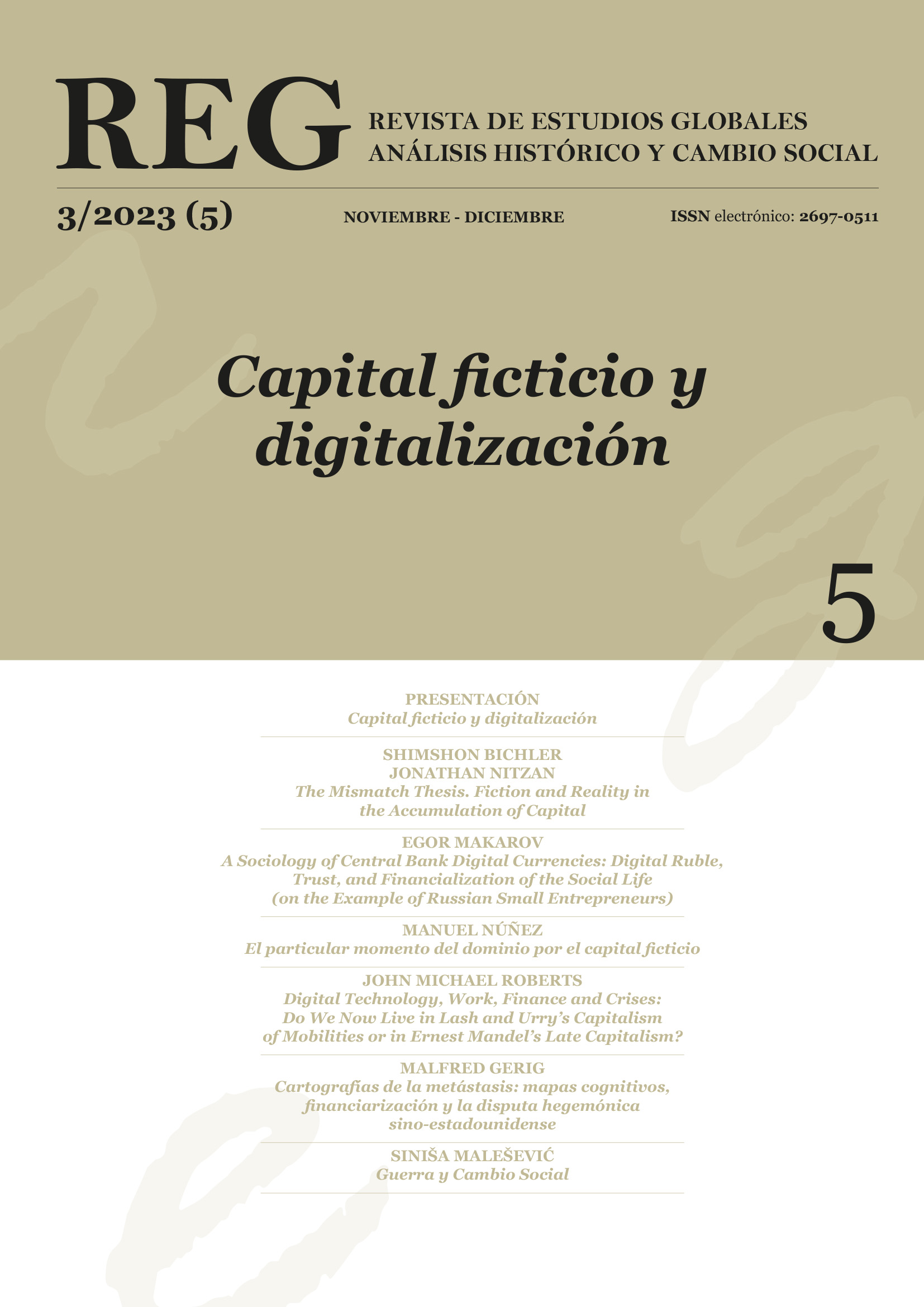A Sociology of Central Bank Digital Currencies: Digital Ruble, Trust, and Financialization of the Social Life (on the Example of Russian Small Entrepreneurs)
Abstract
This paper provides sociological account of central banks digital currencies (CBDCs), and digital ruble particularly. The development of digital economy stimulates active attention of governments of different countries. In some of them, including Russia, one of the reactions on these developments is the emergence of central banks digital currencies. From a sociological perspective, money is a social process embedded in social relations. One of the major aspects in this regard is trust. This paper analyzes the problem of trust on theoretical level as a systemic characteristic of social network enabling the shift from monetary mediums to money-as-account. The problem of trust touches the micro level of monetary proliferation. The paper, thus, discovers the narratives of trust, choice and enforcement using 12 interviews with small Russian entrepreneurs. It distinguishes between impersonal, technological, and institutional trust and shows discursive patterns among them. The results the paper presents are that at the level of narrative, technological optimism and skepticism could be distinguished in relation to the perception of possibility of enlarging institutional control. At the practical level, impersonal trust is identified as a major factor of digital ruble adoption. The findings of the paper fits with the literature on monetary proliferation and make a contribution to understanding patterns of new monetary forms adoption at the practical level.
Downloads
Metrics
-
Abstract286
-
pdf183
References
Armstrong M. (2006) Competition in two-sided markets. Rand Journal of Economics. pp. 668-691.
Ailon, G. (2022) The Double Meaning of Money. Sociological Theory. 40(1): 82-97.
Avdeeva, D. (2019) Trust in Russia and its connection with the level of economic development. Social Science and Modernity [Obshchestvennye nauki i sovremennost]. No. 3. Pp. 79-93. (in Russian).
Bessonova, O. (2018). Integral-institutional paradigm and the Russian way: overcoming the defects of the concepts of Power–Property and XY matrices. Obshchestvennye nauki i sovremennost, (4), 129-144. (in Russian).
Bourdieu, P. (1998). Practical Reason—On the Theory of Action. Stanford, CA: Stanford University Press.
Barontini C, Holden H. (2019) Proceeding with Caution - a Survey on Central Bank Digital Currency. BIS Paper. No. 101.
Caliskan, K. (2023) Data Money: Inside Cryptocurrencies, Their Communities, Markets, and Blockchains, New York Chichester, West Sussex: Columbia University Press.
Carruthers B. (2009) A Sociology of Bubble. Contents, vol. 8, no 3, pp. 22–26.
Carruthers, B., Espeland, W. (1998) Money, Meaning, and Morality. American Behavioral Scientist. 41(10):1384-1408.
Central Bank Digital Currency Tracker. (2023, December 15). Atlantic council. https://www.atlanticcouncil.org/cbdctracker/
Digital ruble. Consultation Paper. The Bank of Russia. (2020) https://cbr.ru/eng/analytics/d_ok/dig_ruble/ (Accessed 15.12.2022).
Desan C. (2017) The Constitutional Approach to Money: Monetary Design and the Production of the Modern World. Money Talks: Explain How Money Really Works (eds. N. Bandelj, F. F. Wherry, V. A. Zelizer), Princeton: Princeton University Press, pp. 109-130.
Dodd N. (1994) The Sociology of Money: Economics, Reason & Contemporary Society, Michigan: Continuum.
Dodd, N. (2014) The Social Life of Money, Princeton; Oxford: Princeton University Press.
Dodd N. (2017) The Social Life of Bitcoin. Theory, Culture & Society. 35 (3): 35–56. URL: https://doi. org/10.1177/0263276417746464
Dodd N. (2007) On Simmel’s Pure Concept of Money: A Response to Ingham. European Journal of Sociology, vol. 48, no 2, pp. 273–294. DOI: 10.1017/S0003975607000379
Esposito. E. (2011) The Future of Futures. The Time of Money in Financing and Society. MA, Northampton.
Fligstein N. (2021) The Banks Did It: an Anatomy of the Financial Crisis. Harvard: Harvard University Press. 336 p.
Feinig, J. (2020) Toward a moral economy of money? Money as a creature of democracy, Journal of Cultural Economy, 13:5, 531-547, DOI: 10.1080/17530350.2020.1729223
Guseva A. (2008) Into the Red: The Birth of the Credit Card Market in Postcommunist Russia. Stanford: Stanford University Press.
Granovetter, M. (1985). Economic Action and Social Structure: The Problem of Embeddedness. American Journal of Sociology, 91(3), 481–510. http://www.jstor.org/stable/2780199
Giddens, A. (1986). The constitution of society. Polity Press.
Gunawan H, Langgu Sinaga B., Sigit Purnomo. (2019) Assessment of the Readiness of Micro, Small and Medium Enterprises in Using E-Money Using the Unified Theory of Acceptance and Use of Technology (UTAUT) Method. Procedia Computer Science 161:316–23.
Geertz, C. (2008). Thick description: Toward an interpretive theory of culture. In The cultural geography reader (pp. 41-51). Routledge.
Graeber D. 2011. Debt: The First 5000 Years. New York: Melville House Publishing.
Horne, D., Nickerson D., DeFanti M. (2015) Improving Supply Chain Efficiency Through Electronic Payments: The Case of Micro-Entrepreneurs in Kenya and Tanzania. Journal of Marketing Channels 22(2):83–92.
Ho, B. (2021). Why Trust Matters: An Economist’s Guide to the Ties That Bind Us. Columbia University Press. http://www.jstor.org/stable/10.7312/ho--18960
Ingham G. (2000) ‘Babylonian Madness’: On the Historical and Sociological Origins of Money. In: Smithin J. What is Money? London: Routledge. pp. 16–42.
Ingham G. (2004) The Nature of Money. Cambridge: Polity Press.
Karatani, K. (2003) Transcritique: On Kant and Marx. The MIT Press.
Kosals, L. (2022). Legitimation of innovation: The case of AI technology for facial recognition. In V. Radaev & Z. Kotelnikova (Eds.), The Ambivalence of Power in the Twenty-First Century Economy: Cases from Russia and beyond (pp. 80–99). UCL Press. https://doi.org/10.2307/j.ctv280b65x.13
Kinney, A. (2021) Embedding into an Emerging Money System: The Case of Bitcoin. Sociological Focus. 54(1): 77-92.
Keynes J. M. (1930) A Treatise on Money, Cambridge: Cambridge University Press.
Knapp G. F. (1924) The State Theory of Money, London: Macmillan.
Krippner, G. (2011) Capitalizing on Crisis: The Political Origins of the Rise of Finance. Harvard University Press.
Law on Digital Ruble Adopted. (2023, December 15). Bank of Russia. https://www.cbr.ru/eng/press/event/?id=16900
Luhmann, N. (1995) Social Systems. Stanford: Stanford University Press.
Luhmann, N. (2018). Trust and power. John Wiley & Sons.
MacKenzie, D., Millo, Y. (2003) Constructing a Market, Performing Theory: The Historical Sociology of a Financial Derivatives Exchange. American Journal of Sociology. 109(1): 107-145.
Makarov, E. (2020) Sociological Problem of Trust in Money Currencies: An Institutional Factor. Journal of Sociology and Social Anthropology. No 5. Pp. 135-154. (in Russian) https://doi.org/10.31119/jssa.2020.23.5.5
Marx, K. (2005). Grundrisse: Foundations of the critique of political economy. Penguin UK.
Menger K. (1892) On the Origins of Money. The Economic Journal. 2 (6): 239–477.
Polillo S. (2011) Money, Moral Authority, and the Politics of Creditworthiness. American Sociological Review. Vol. 76. No. 3. Pp. 437 –464.
Polillo, S. (2022) From Collateral to Money: Social Meaning, Security Devices and the Law in the Depersonalization of Monetary Relationships. Journal of Cultural Economy. 15(3): 310-325.
Rysman M. (2007) Empirical Analysis of Payment Card Usage. Journal of Industrial Economics. 55 (1): 1–36. DOI: 10.1111/j.1467-6451.2007.00301.x
Smith, A. (2002) The Wealth of Nations. Oxford, England: Bibliomania.com Ltd. [Web.] Retrieved from the Library of Congress, https://lccn.loc.gov/2002564559.
Shapiro, S. (1987) The Social Control of Impersonal Trust. American Journal of Sociology. 93(3): 623-658.
Simmel G. (2011) The Philosophy of Money. London: Routledge.
Small, M. (2009) ‘How Many Cases Do I Need?’ On Science and the Logic of Case Selection in Field-Based Research,” Ethnography 10(1): 5-38.
Spang, R. (2015) Stuff and Money in the Time of the French Revolution. Cambridge: Harvard University Press.
Zuboff, S. (2019) The Age of Surveillance Capitalism: The Fight for a Human Future at the New Frontier of Power. New York: PublicAffairs.
Copyright (c) 2024 Revista de Estudios Globales. Análisis Histórico y Cambio Social

This work is licensed under a Creative Commons Attribution-NonCommercial-NoDerivatives 4.0 International License.










